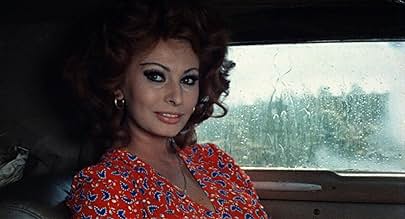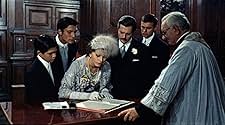NOTE IMDb
7,4/10
12 k
MA NOTE
Un homme riche, Domenico, et Filumena, une prostituée démunie, partagent une grande partie de leur vie dans l'Italie du lendemain de la Seconde Guerre mondiale.Un homme riche, Domenico, et Filumena, une prostituée démunie, partagent une grande partie de leur vie dans l'Italie du lendemain de la Seconde Guerre mondiale.Un homme riche, Domenico, et Filumena, une prostituée démunie, partagent une grande partie de leur vie dans l'Italie du lendemain de la Seconde Guerre mondiale.
- Réalisation
- Scénario
- Casting principal
- Nommé pour 2 Oscars
- 7 victoires et 10 nominations au total
Marilù Tolo
- Diana
- (as Marilu' Tolo)
Alberto Castaldi
- Doctor
- (as Alberto Gastaldi)
Vincenzo Aita
- Alfonso - Priest
- (non crédité)
Avis à la une
MARRIAGE Italian STYLE is a glossy rendition of Eduardo De Filippo's Neapolitan play "Filumena Marturano", which he himself had made into a film in 1951. In this 1964 version Sophia Loren and Marcello Mastroianni take the roles previously played by Eduardo and Titina De Filippo. The story deals with the long love affair between a wealthy, arrogant and selfish Neapolitan businessman (Marcello Mastroianni) and the seemingly ignorant ex-prostitute (Loren) who attempts to trick him into marriage by pretending to be dying and then bouncing back to life. She does all this because she wants to guarantee a better life for her three semi-secret children. One of her children is his, she tells him. Which one, she will never say.
To say that Mastroianni and Loren had on-screen chemistry is an enormous understatement. They are both as marvelous together here as is other films together, most notably YESTERDAY, TODAY, AND TOMORROW and A SPECIAL DAY. For me one of the best moments in the film is Loren's walk down a sidewalk in Naples where the men and boys alike gape at her. That always knocks me out. Loren walks marvelously there and does a magnificent acting job elsewhere in this engaging dramatic farce. The film was directed by Vittorio De Sica, who had directed Loren's Academy Award performance in TWO WOMEN (LA CIOCIARA). It is among her most notable roles ever, along with TWO WOMEN, A SPECIAL DAY, THE BLACK ORCHID, and Lina Wertmüller's Saturday, Sunday, AND Monday.
To say that Mastroianni and Loren had on-screen chemistry is an enormous understatement. They are both as marvelous together here as is other films together, most notably YESTERDAY, TODAY, AND TOMORROW and A SPECIAL DAY. For me one of the best moments in the film is Loren's walk down a sidewalk in Naples where the men and boys alike gape at her. That always knocks me out. Loren walks marvelously there and does a magnificent acting job elsewhere in this engaging dramatic farce. The film was directed by Vittorio De Sica, who had directed Loren's Academy Award performance in TWO WOMEN (LA CIOCIARA). It is among her most notable roles ever, along with TWO WOMEN, A SPECIAL DAY, THE BLACK ORCHID, and Lina Wertmüller's Saturday, Sunday, AND Monday.
After anthologies "Boccaccio 70" and "Yesterday, Today and Tomorrow," director Vittorio De Sica returns to a single story format with his favorite actress Sophia Loren, joined yet again by Marcello Mastroianni, evoking memories of her Oscar-winning turn in "Two Women" as Filumena, devoted companion to Mastroianni's wealthy Domenico, who discovered her as a frightened 17 year old in a bordello during a wartime bomb raid, putting her to work as a domestic in his mother's home rather than waste his position in society on a woman below his station. 20 years pass and she now lies on her deathbed, requesting the presence of a priest who promptly joins the two in marriage (just as he's prepared to wed a girl half his age), Domenico stunned to see Filumena up in no time and fighting fit, and more determined than ever to emerge the victor in this battle of the sexes, not so much for herself but for the three sons she has secretly cared for over the years. There are amusing moments to be sure but it's by heart a serious drama in which Sophia effortlessly ages from bubbly coquette to middle aged dowager over 100 minutes yet still meets her perfect match in Marcello Mastroianni, who has no business being so likable when he's essentially portraying a cad.
When De Sica finally got around to filming Eduardo De Filippo's great play "Filumena" he chose two of Italian cinema's finest actors to play the leads and even if the change of title to "Marriage Italian Style" was something of a sop to commercialism the end result was still hugely satisfying. Sophia Loren, (magnificent), is Filumena, the Neopolitan prostitute, and Marcello Mastroianni, (also superb), the rich patron who strings her along for years, always finding an excuse not to marry her.
It is, of course, a comment on Italian machismo and of the subservient role of women in Italian society so perhaps the comic possibilities of the plot might escape a non-Italian audience, (comedy was never De Sica's strong point). Still, Sophia was never more radiant than she is here, so what's not to love, (she was Oscar-nominated), and De Sica does manage to keep the potential for sentimentality at arm's length. Unfortunately, the film isn't as highly thought of as it once was and isn't much seen today.
It is, of course, a comment on Italian machismo and of the subservient role of women in Italian society so perhaps the comic possibilities of the plot might escape a non-Italian audience, (comedy was never De Sica's strong point). Still, Sophia was never more radiant than she is here, so what's not to love, (she was Oscar-nominated), and De Sica does manage to keep the potential for sentimentality at arm's length. Unfortunately, the film isn't as highly thought of as it once was and isn't much seen today.
One of the biggest hits of the "Italian Comedy", starred by the top of the Italian star-system. De Sica give us a solid film all along the length, taking us from drama to comedy, they're separated by a faint border; as the life itself.
Obviously, the time has passed and some points are old-fashioned (technical resources, technology, life's perspective) but it's true the film gets one realistic approach (it couldn't be less being this film one of the examples of Italian neo-realism) about the drama of a woman who looks for dignity and fights for the good of her children.
This pink neo-realism sows us the common life of Italian people after WWII. Mediterranian country, misogyny, catholic, conservator, noisy similar to Spain (españolada, Landismo), Greece, etc.
Good performances form Mastroianni, who is a playboy but with a good heart at least, and, especially Sophia Loren, at her prime, as Filomena, a prostitute who will fight for her honesty, dignity and her sons, a woman with attitude, tough in her acts and with some real curves. In other words the best "donna", along with Magnani, in all history.
De Sica, without reaching the lever of previous works in the 40's, makes a gret work in a field he controls like only a few people more. Good photography and ambiance. Music as Italian music, little cloying but it don't bother and it suits the film.
Thou, there are some negative points: - Relationship with children and their reaction are unnatural and the aren't worked as it'd be necessary. - Story could be analyzed in a deeper way. It's a good topic. - Make-up of Loren at 17, she doesn't look even for a moment, her body is different, no one can't do it something about it with that clothes, but the make-up could be better.
But it's a good movie, despise of these thing and the fact that is a movie made in the early 60's and other things I can't remember. You can enjoy this film and discover if you didn't make it earlier the refreshing Italian cinema.
Obviously, the time has passed and some points are old-fashioned (technical resources, technology, life's perspective) but it's true the film gets one realistic approach (it couldn't be less being this film one of the examples of Italian neo-realism) about the drama of a woman who looks for dignity and fights for the good of her children.
This pink neo-realism sows us the common life of Italian people after WWII. Mediterranian country, misogyny, catholic, conservator, noisy similar to Spain (españolada, Landismo), Greece, etc.
Good performances form Mastroianni, who is a playboy but with a good heart at least, and, especially Sophia Loren, at her prime, as Filomena, a prostitute who will fight for her honesty, dignity and her sons, a woman with attitude, tough in her acts and with some real curves. In other words the best "donna", along with Magnani, in all history.
De Sica, without reaching the lever of previous works in the 40's, makes a gret work in a field he controls like only a few people more. Good photography and ambiance. Music as Italian music, little cloying but it don't bother and it suits the film.
Thou, there are some negative points: - Relationship with children and their reaction are unnatural and the aren't worked as it'd be necessary. - Story could be analyzed in a deeper way. It's a good topic. - Make-up of Loren at 17, she doesn't look even for a moment, her body is different, no one can't do it something about it with that clothes, but the make-up could be better.
But it's a good movie, despise of these thing and the fact that is a movie made in the early 60's and other things I can't remember. You can enjoy this film and discover if you didn't make it earlier the refreshing Italian cinema.
10paolo-28
Well I think that you should watch this wonderful Italian film. It is taken from the comedy "Filumena Marturano" by Eduardo De Filippo. Marcello Mastroianni is superb and Sophia Loren is excellent. It's a pity she didn't won the second Oscar as best actress of this film.
The title-song "'O cielo ce manna 'sti 'ccose" by Fred Bongusto is absolutely wonderful.
The title-song "'O cielo ce manna 'sti 'ccose" by Fred Bongusto is absolutely wonderful.
Le saviez-vous
- AnecdotesDomenico arranges an apartment in Naples for Filumena. The former tenant's belongings are still in. There is a picture of Clara Petacci (dictator Mussolini's mistress) on the wall and Filumena asks when this will be removed. The scene is set in the late 1940s, so this obviously symbolizes Italy's transition from fascism to a republic. Mussolini himself would probably not have passed the censors.
- Citations
Filumena Marturano: [subtitled version] The problem is that our hearts used to be so big...
[holds up pebble]
Filumena Marturano: and now look how small they are.
- ConnexionsEdited into Marcello, una vita dolce (2006)
- Bandes originalesMunasterio 'e Santa Chiara
(uncredited)
Written by Michele Galdieri and Alberto Barberis
Sung by Don Domenico on the trip home from the racecourse; Don Domencio also asks the boys to sing it
Meilleurs choix
Connectez-vous pour évaluer et suivre la liste de favoris afin de recevoir des recommandations personnalisées
- How long is Marriage Italian Style?Alimenté par Alexa
Détails
Box-office
- Montant brut aux États-Unis et au Canada
- 10 600 $US
- Week-end de sortie aux États-Unis et au Canada
- 4 967 $US
- 25 sept. 2011
- Montant brut mondial
- 259 009 $US
- Durée1 heure 42 minutes
- Mixage
- Rapport de forme
- 1.85 : 1
Contribuer à cette page
Suggérer une modification ou ajouter du contenu manquant

Lacune principale
By what name was Mariage à l'italienne (1964) officially released in Canada in French?
Répondre




























